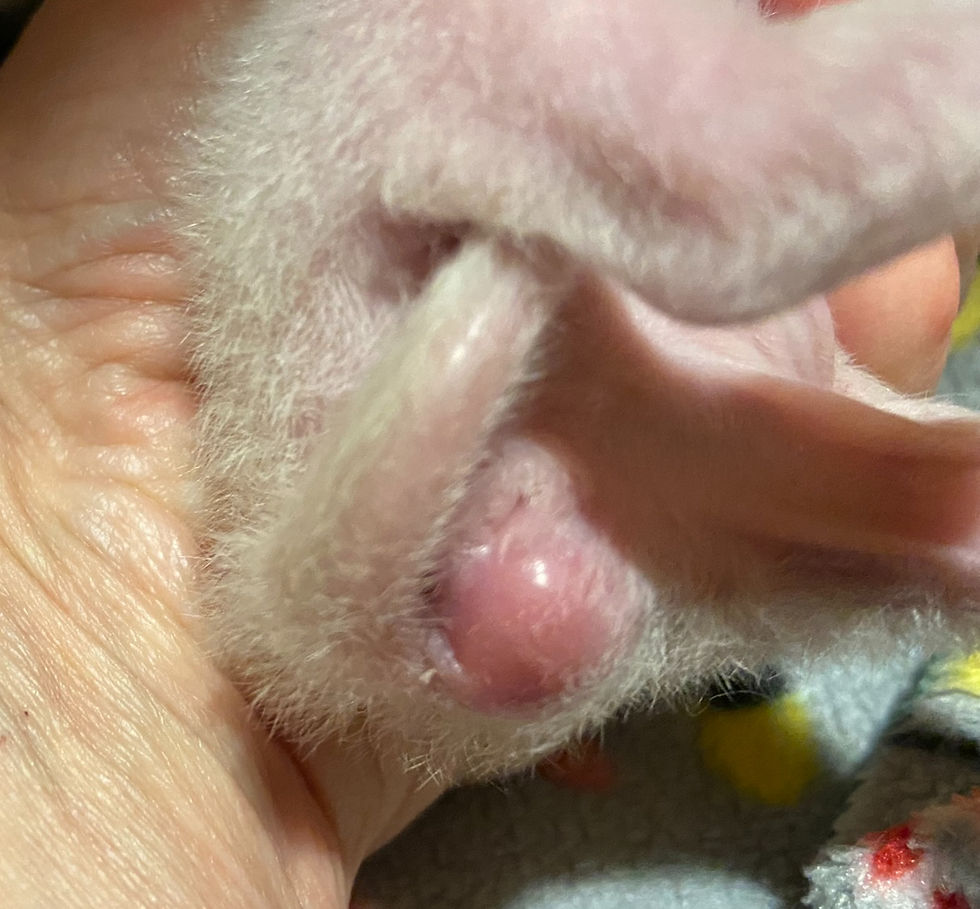Perianal Abscesses & Constipation in Neonatal Kittens: What Breeders Need to Know
- miriamm00
- Jul 3, 2025
- 2 min read
Neonatal kittens are delicate, and even small issues can quickly escalate if we don’t catch them early. There often isn’t time to seek vet advice. One problem I’ve seen a few times is constipation leading to perianal abscesses—a nasty but preventable issue that every breeder should be aware of.

The Link Between Constipation & Abscesses
In one recent case, a kitten developed a perianal abscess after struggling with constipation. This little one was initially supplemented with a well-known, colostrum-based kitten milk formula. While these products have their place, I’ve learned from experience that they aren’t ideal long-term for all kittens.
These days, I use that branded milk only for the first day, then switch to a lactose-free pet milk, often from the supermarket, which I supplement with a small amount of oil, taurine, and vitamins. Some breeders also use goats’ milk with good results. Ask experienced local breeders near you what they use.
Despite our best efforts, constipation can still happen. If a kitten is straining to pass stools, pressure builds in the area, and this can result in a perianal abscess.
How Do You Know a Kitten is Constipated?
In these tiny babies, signs can be subtle, so it pays to watch closely:
✔ Distended Belly — If their abdomen feels bloated or looks enlarged✔ Rapid Weight Gain — If their weight goes up disproportionately, suspect they’re holding onto waste✔ Straining or Crying — When trying to pass stools (you probably wont see this in a 1 week old kitten)✔ Hard Abdomen on Palpation — A firm distended belly can indicate a build-up.
Treating the Abscess
In the case of a perianal abscess, quick intervention is essential. I gently restrain the kitten and use the sterile tip of a needle to carefully incise the abscess. With gentle pressure, the pus expresses, relieving the kitten. (note, he wont like you much but that’s OK, he’s now going to survive).
Of course, consult your vet if you're unsure — but with tiny neonates, timely, gentle home intervention can save lives.
Managing Constipation
One trick I’ve found incredibly effective is using warm water to help soften and move the stool:
💡 How I Do It: I gently insert the tip of an orogastric feeding tube about 3 cm, roughly the equivalent distance under the ribs. Then I slowly syringe in a small amount of warm water (3-4 mls is usually plenty). It’s honestly satisfying (and a relief for the kitten!) when a large, hard poop finally passes.
Do you need antibiotics?
Technically speaking -probably not. In human medicine the evidence is that incising and draining an abcess is the most important issue and antibiotics are generally not required. However, in a tiny neonate, I feel a bit nervous and tend to treat. See your vet for their advice in this instance.
The kitten in the above photo and video below was successfully treated and grew up to be a normal healthy kitten.



Comments